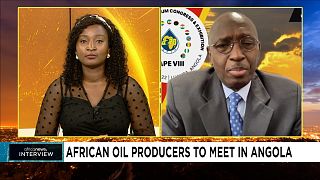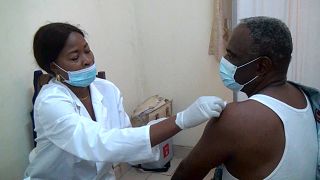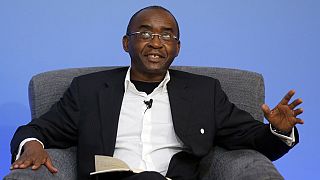Interview
"COVID-19 in Africa. One year on: Impact and Prospects" is the name of the 2021 report published by the Mo Ibrahim Foundation ahead of the Ibrahim Forum.
An annual event held in early June and attended by leaders on the African continent. For three days, they explored the health, economic, social and political impacts of the pandemic in Africa.
"Africa hasn't been idle", said Africa Center for Disease Control and Prevention Director Dr. John Nkengasong in an exclusive interview with Africanews.
He insisted on the importance of strengthening public health institutions' capacities to effectively fight this pandemic and called for more attention to the training of health workers across the continent.
Africanews' Raphaële Tavenier spoke to Dr. Nkengasong to find out what are the challenges that stand in the way of Africa, one year after the pandemic struck the continent.
You can watch the full interview in the video player above.
To what extent has the Covid-19 crisis weakened the African continent? In terms of health, of course, but also in economic and social terms.
The COVID-19 crisis has affected Africa a lot, especially in terms of health. Today there are about 140,000 deaths, with a fatality rate of about 2.7%. That means that out of one hundred infected, three die.
Some tend to think that Africa has not been seriously affected by the virus, compared to other regions of the world. But this is not the case. 140,000 people have died. That is a lot, in only 18 months.
Africa has also been affected economically. There are also great fears about the food security of our populations. For the past year, many children were not able to go to school in Africa. There is a lack of words to characterize the impact of COVID-19 in several sectors in Africa.
It seems the strengthening of African capacities has become a priority. How can this be done and what are, in your opinion, the essential measures to be implemented?
There are at least four areas where Africans, in partnership with our collaborators, must really focus their energy. First, focus especially on the strengthening of our capacities in terms of our public health institutions to effectively fight this pandemic.
Second, we must ensure that the training of health workers is increased. Today, in Africa, there are less than 3 million healthcare workers. This is very few compared to a continent with 1.2 billion people.
Africa must be able to manufacture vaccines, diagnostic tests and medicine. Today, we import 99% of our vaccines! Africa must change all this to be able to prepare itself to fight against this pandemic and the pandemics to come.
Let's talk about vaccine distribution. Does Africa have a real continental strategy? What is the status of the Africa Vaccine Acquisition Task Team (AVATT) initiative ?
The AVATT initiative has been very successful in that at least 400 million doses of Johnson & Johnson vaccine have been purchased. Africa hasn't been idle!
Delivery begins in two weeks. This is a great hope for the African continent. In the coming weeks, we will be able to restart the vaccination program on the continent.
Africa relied on the WHO-supported mechanisms of COVAX. But distribution has been halted for several months, in part because of the situation in India. Africa has been able to vaccinate less than 2% of its population, a population of 1.2 billion people.
But 400 million doses of vaccine will not allow us to vaccinate 60% of the population, as we hoped. Close collaboration with the COVAX initiative remains necessary and important.
The World Health Organization warns of a strong increase of Covid-19 contaminations in Africa. Some countries are seeing their cases double. How do you think the situation will evolve on the continent in the short and long term?
We are going through a very difficult time, as at least 20 countries are experiencing a third wave. And the severity of infections is more worrying compared to the second wave. This means that if the vaccine does not arrive, if the continent does not manage to immunize the population in time, Africa will continue to have difficulties in controlling the pandemic.
Not all regions of Africa are affected in the same way. Could you give us an overview of the situation?
We see that Southern Africa, especially right now, is seeing a significant increase. Perhaps because the sub-region is in the middle of summer, people do not go out easily, they stay indoors. So we see that there is a big increase in countries like South Africa, Namibia, Zambia...
There is also an important increase in North Africa as well, in countries such as Egypt, Tunisia. But on the other hand, in Central Africa and West Africa, we continue to see a decrease in infection rates.
So the five regions of Africa are not affected in the same way.
Does the focus on COVID-19 jeopardize involvement in the fight against the continent's biggest killers: malaria, tuberculosis and AIDS?
It's obvious that the fight against these diseases has been impacted. Diseases like HIV, where there has been a decrease of maybe 40% in testing rates since last year. I fear a lot of African countries might be affected by this virus as the result of the crisis. There will also be a lot of deaths related to HIV that will be the result of COVID-19.
For sure there will be a huge impact on these three diseases, namely malaria, TB, HIV. Let's not forget that the HIV pandemic still exists on our continent and hasn't been contained.













11:15
AI drones lead breakthrough against malaria in Africa [Business Africa]
01:29
Experts warn of danger of exercising in extreme heat and humidity
Go to video
What to know about the COVID variant that may cause 'razor blade' sore throats
01:29
US medication safety agency approves biannual preventive HIV shot
01:47
Chinese city of Xuchang is world's biggest producer of wigs
01:15
U.S. considers adding more African countries to travel ban